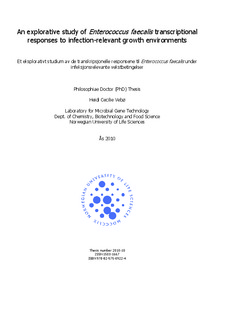| dc.contributor.advisor | Nes, Ingolf F. | |
| dc.contributor.advisor | Aakra, Ågot | |
| dc.contributor.advisor | Brede, Dag A. | |
| dc.contributor.author | Vebø, Heidi Cecilie | |
| dc.date.accessioned | 2017-02-16T16:41:29Z | |
| dc.date.available | 2017-02-16T16:41:29Z | |
| dc.date.issued | 2010 | |
| dc.identifier.isbn | 978-82-575-0922-4 | |
| dc.identifier.issn | 1503-1667 | |
| dc.identifier.uri | http://hdl.handle.net/11250/2431143 | |
| dc.description.abstract | Enterococcus faecalis is commonly found in the gastrointestinal tract of humans. It is also an opportunistic pathogen and one of the leading causes of nosocomial infections worldwide. The treatment of E. faecalis infections is often difficult due to its innate and acquired antibiotic resistance. Several functional studies have been performed to link genetic traits to antibiotic resistance and virulence. However, there are still many unanswered questions regarding the importance of virulence factors, and the global regulation of these and other genes in the pathogenicity of this bacterium. Therefore, a more comprehensive understanding of the global gene regulation of E. faecalis in response to different growth environments is needed, as well as an understanding of how this gene regulation affects the establishment of an infection.
This thesis focuses on the importance of E. faecalis’ gene regulation in response to the infection-relevant growth conditions blood, urine and exposure to erythromycin. The effect of a small percentage (10%) of blood on the transcriptome of E. faecalis, as well as the different transcriptional profiles of three diverse E. faecalis isolates grown in urine were also examined.
The work in this thesis showed that erythromycin inhibits the growth of the resistant V583 strain and affects the transcription of several genes, but not the constitutively expressed erm(B) gene that confers erythromycin resistance. Furthermore, we discovered that growth in blood and urine resulted in several similar transcriptional responses despite the use of four diverse isolates. Important responses to blood and urine include a reduced transcription of genes involved in the production of cell wall polysaccharides, enhanced transcription of several stress genes, including many involved in oxidative stress, and enhanced transcription of genes encoding iron- and manganese-uptake systems. Each environment also activated a unique subset of genes, an effect that was particularly evident for genes related to metabolism.
The enhanced transcription of lrgAB was unique to growth in blood. The function of these two genes is so far unknown in E. faecalis and could be interesting to study more closely. Growth in urine revealed a strain specific enhanced regulation of the virulence related fsroperon, which could give an indication to the isolates pathogenic potential. All three studies revealed that the modulation of the E. faecalis cell envelope is important for the adaptation to growth in these three infection-relevant environments. | nb_NO |
| dc.description.abstract | Enterococcus faecalis finnes ofte som en del av menneskets tarmflora. Den er også en opportunistisk patogen, og er en av hovedårsakene til sykehusinfeksjoner verden over. Behandlingen av E. faecalis infeksjoner er ofte vanskelige på grunn av bakteriens nedarvede og tilegnede antibiotikaresistens. Mange funksjonelle studier har blitt utført for å koble genetiske egenskaper mot antibiotikaresistens og virulens. Imidlertid er det fortsatt ukjent hvor stor betydning antatte virulens faktorer, og den globale reguleringen av disse og andre gener, faktisk har for denne bakteriens patogenisitet. Derfor er det behov for en mer inngående forståelse av hvordan den globale genreguleringen i E. faecalis responderer på ulike vekstbetingelser, og hvordan denne genreguleringen influerer etableringen av infeksjoner.
Denne avhandlingen fokuserer på hvordan genreguleringen i E. faecalis påvirkes av de infeksjonsrelevante vekstbetingelsene blod, urin og vekstmedium tilsatt antibiotikumet erythromycin. Effekten av en liten prosentandel (10%) blod på transkripsjonen, samt forskjeller i transkripsjonsprofilene til tre ulike E. faecalis isolater dyrket i urin ble også undersøkt.
Arbeidet i denne avhandlingen viste at erythromycin hemmer veksten av den resistente V583-stammen og påvirker transkripsjonen av mange gener, men ikke det konstitutivt uttrykte erythromycinresistensgenet erm(B). Videre oppdaget vi at vekst i blod og urin ga mange liknende transkripsjonsprofiler, selv om fire ulike isolater ble undersøkt. Viktige responser i blod og urin omfatter redusert transkripsjon av gener involvert i produksjon av celleveggpolysakkarider, økt transkripsjon av mange stress-gener blant annet flere involvert i oksidativt stress og økt transkripsjon av gener som koder for jern- og manganopptakssystemer.
Begge vekstbetingelsene aktiverer også et unikt sett med gener, og denne effekten var spesielt tydelig for gener relatert til metabolisme. En unik respons ved vekst i blod var en økt transkripsjon av lrgAB, to gener med hittil ukjent funksjon i E. faecalis som kan være interessante å studere videre. Ved vekst i urin fant vi et stammespesifikt uttrykk av det virulensrelaterte fsr-operonet, noe som dermed kan gi en indikasjon på isolatets patogene potensial. Alle tre studiene viste at forandringer i celleveggen/cellemembranen til E. faecalis er viktig for tilpasningen til vekst i disse tre infeksjonsrelevante betingelsene. | nb_NO |
| dc.language.iso | eng | nb_NO |
| dc.publisher | Norwegian University of Life Sciences, Ås | nb_NO |
| dc.relation.ispartofseries | PhD Thesis;2010:10 | |
| dc.rights | Attribution-NonCommercial-NoDerivatives 4.0 Internasjonal | * |
| dc.rights.uri | http://creativecommons.org/licenses/by-nc-nd/4.0/deed.no | * |
| dc.title | An explorative study of Enterococcus faecalis transcriptional responses to infection-relevant growth environments | nb_NO |
| dc.title.alternative | Et eksplorativt studium av de transkripsjonelle responsene til Enterococcus faecalis under infeksjonsrelevante vekstbetingelser | nb_NO |
| dc.type | Doctoral thesis | nb_NO |
| dc.subject.nsi | VDP::Medical disciplines: 700 | nb_NO |
| dc.source.pagenumber | 1 b. (fl. pag.) | nb_NO |

